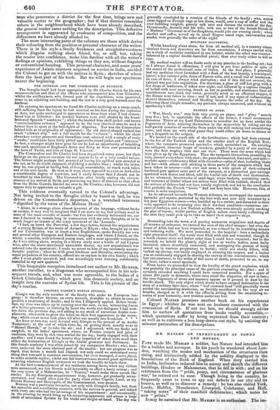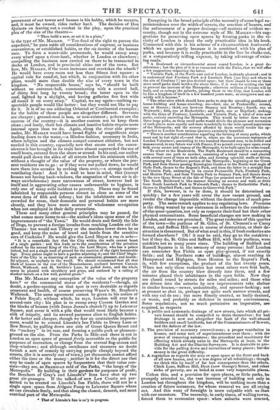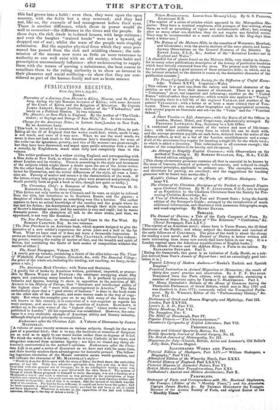MR. MASLEN ON IMPROVEMENT OF TOWNS AND ROUSES.
FATE made Mr. MASLEN a soldier, but Nature had intended him for a builder and surveyor. In his youth he wandered about London, watching the modes and mechanism of the structures then rising, and instinctively edified by the solidity displayed in the foundations of the Bank of England. When duty carried him to India, inclination induced him to survey and sketch the different buildings, Hindoo or Mahometan, that he fell in with; and on his retirement from the "pride, pomp, and circumstance of glorious war," be retired not to ease. Though living in the country, he frequently came to town to spy out defects in our city and its houses, as well as to discover a remedy : he has also visited York, Leeds, Halifax, Manchester, Liverpool, Colchester, and Hull, "taking notes" of their manifold deficiencies ; which notes he now " prints." It may be surmised that Mr. Masratm is an enthusiast. The int
provement of our towns and houses is his hobby, which he mounts, and, it must be owned, rides rather hard. The decision of Don Quixote on leaving out a combat in the play, upon the practical plea of the size of the theatre
" Then build a new, or act it in a plain," is the type of Mr. MASLEN. "Too fond of the right to pursue the expedient," he puts aside all considerations of expense; or business convenience, or established habits, or the vis inertice of the human race._ To form a water-side promenade, he would sweep away every wharf upon a river-bank, whether in London or elsewhere ; compelling the business now carried on there to be transacted in docks at London, and in provincial cities out of the town. But how, Mr. MASLEN, if the town increases and overtakes the wharfs ? He would have every room not less than fifteen feet square : a capital rule for comfort, but which, in conjunction with his other plans, would more than double the size of every town in the kingdom. "No respectable house," says he, "should be built without an entrance-hall, communicating with a central hall, of thirty feet long by twenty broad ; the latter open to the roof, lighted by a skylight, and having galleries five feet wide all round it on every story." Capital, we say again—nothing respectable people would like better : but they would not like to pay for it. It is of no use adducing Oriental or Continental examples ; for the habits of those people are altogether different. Servants are cheaper ; ground-rent is less, or non-existent ; palaces are the custom of the country—it is another custom not to keep them clean ; and lastly, their hot climate and inactive habits require more internal space than we do. Again, along the river-side promenades, Mr. MASLEN would have broad flights of magnificent steps leading down to the water,—a Hindoo fashion, necessary in India, where religion and the climate compel constant ablution, but not needed in this country, especially now that steam and the conveniences it has brought in its train have almost superseded the use of small boats, entered from the shore or strand. In his zeal, our author would pull down the sides of all streets below his minimum width, without a thought of the value of the property, or where the present residents are to go : or if they were not pulled down, he would turn them into arcades by arching them over,—a strange mode of ventilating them ! And it is well to bear in mind, that (except houses not having back-windows, the stagnation of whose air is always unwholesome) mere narrowness of street, however bad in itself and in aggravating other causes unfavourable to hygiene, is only one of many evils incident to poverty, Places may be found inhabited by respectable persons almost as close as some of the worst dens of filth and infamy ; but the inhabitants are not so crowded for room, their domestic and personal habits are more cleanly, and they have more sources of wholesome occupation when not employed in their daily avocations.
These and many other general principles may be passed, for what comes more home tons—the author's ideas upon some of the improvements of "the Town." He would drain and fortify the Isle of Dogs, to prevent a foreign invader from reaching London yid the Thames : but would not Tilbury or the marshes lower down be as good, and keep the noise of brawl and battle from the sensitive ears of Cocknies ? He would give the Lord Mayor a ms in urbe
" It is a remarkable fact that the City within the walls cannot boast of a single garden : and this leads us to the consideration of the privation suffered by the annual King of the City, the Lord Mayor, who has a palace indeed, but not a single rood of ground for the exercise of the right honourable legs. Every palace ought to have a garden adjoining it ; and the Chief Magistrate of the City is as deserving of such an ornamental, pleasant, and healthful adjunct, as anybody in the world. We should recommend that all that block of houses in the rear of the Mansionhouse, enclosed between Cannon Street, Walbrook, and St. Swithin's Lane, be pulled down, and the whole space be planted with shrubbery and grass, and enclosed by a railing of musket-barrels on a low wall, painted green."
Has Mr. MASLEN any conception of the value of the property here ? or the commercial status of the residents ?—though, no doubt, a garden-opening on that spot is very desirable as regards ornament and health, of course preserving WREN'S St. Stephen's Walbrook. The same agreement cannot be given to his notion of a Palais Royal; without which, he says, London will ever be a second-rate city : his plan is to sweep away Covent Garden and the blocks of houses (with INIGO JONES'S church ?) up to Leicester Square, and cover it with a pile that would most likely become a sink of iniquity, and its avowed purposes alien to English habits. A far better and cheaper, though we fear an unattainable improvement, would be to extend Lincoln's Inn Fields to Drury Lane or Bow Street, by pulling down one side of Great Queen Street and the "rookery" in its rear, and forming a public park or pleasureground on the site. From the Parks to Mile-end there is not in London an open space of ground freely accessible to the public for purposes of recreation, or change from the eternal flag-stones and shop-windows ; and although omnibuses and steamers no doubt furnish a sort of remedy by carrying people cheaply beyond the streets, (for it is scarcely out of town,) yet thousands cannot afford either the time or the money : .neither is it for the direct use that may be made of open spaces by frequenters that their value consists—they are, as SHERIDAN said of the Parks, "the lungs of the Metropolis." By building in their gardens for purposes of profit, the Benchers of Gray's and Lincoln's* Inns have shut up two great air-passages. If the talked-of new Law Courts are permitted to be erected on Lincoln's Inn Fields, there will not be a single open space from Aldgate Pump to Leicester Square where air can circulate freely, and that along the closest, densest, and most centrical part of the Metropolis.
• That of Lincoln's Inn is on'y in progress.
Excepting in the broad principle of the necessity of some legal superintendence over the width of streets, the erection of houses, and the enforcement of a proper drainage—all matters of evident necessity, though not in the extreme style of Mr. MASLEN—his suggestions for preserving open spaces by forming parks in the vicinity of London is about the only practicable idea in his book. Connected with this is his scheme of a circumambient boulevard ; which we quote partly because it is combined with his plan of parks, and because it is really practicable in the line he chalks out, at a comparatively trifling expense, by taking advantage of existing roads.
" A Boulevard or circumferential street round London, is a great desideratum; but the plan of it is so connected with the Parks, that we will offer a few suggestions respecting the latter. Victoria Park, at the North-east end of London, is already planned ; and it is understood that Finsbury Park and Lambeth Park (are they and where is the site of Finsbury ?] are also decided upon ; but there should be two or three more small parks made besides the above three, if it were for nothing else but to prevent the increase of the Metropolis ; otherwise millions of houses will be built, and so enlarge the suburbs, joining them to the City, that London will be like a kingdom of itself in a few hundred years more, so overgrown and unwieldy will it become."
"The other sites which should have parks to stop the spreading pestilence of house-building and house-crowding, are—first, one at Pentonville; second, one at Hoxton ; third, one between Stepney and Bromley ; fourth, one at Walworth ; fifth, one at Rotherhithe; and sixth, one at Deptford ; making,. with the three of Finsbury, Lambeth, and Victoria Park, a total of nine new parks, entirely encircling the Metropolis. This would be better than two or three large parks, as these small parks would divide the pleasure and recreation of such places more equally and more beneficially to the wide-spread population of the Metropolis ; and the scenery afforded by them would render the approaches to London from various quarters extremely beautiful. "There is another consideration regarding the forming of many parks, which must not be lost sight of,—and that is, where are the numerous regiments of London Volunteers, amounting to two hundred thousand men, to be drilled and manomvered, in any future war with France, if we permit every open space, every field, every corner and cranny of the Metropolis, to be built upon for miles round.
"To revert to the Boulevards. The North Boulevard should be a connecting avenue from one park to another, consisting of a broad raised road planted with several rows of trees on both sides, and forming splendid malls or drives, encompassing the Northern portion of the Metropolis ; beginning at the Green Park, and from thence passing Kensington Gardens to the North-west angle of Hyde Park, thence to the Regent's Park, and from the latter in a straight line to Victoria Park, embracing in its course Pentonville Park, Finsbury Park, and Hoxton Park ; and from Victoria Park to Stepney Park, and thence down to the new Quay Street at the Isle of Dogs (or proposed new Fort-Waterloo.) The South Boulevard in like manner forming an avenue and mall, or drive from South Lambeth Park to Walworth Park ; thence to Rotherhithe Park; thence to Deptford Park; and thence to Greenwich Park."
If this, however, is to be done, it should be determined on quickly ; for a few years will cover the now vacant ground, and render the change impossible without the destruction of much property. The same remark applies to any regulating laws. Previsiors is the thing wanted by our statesmen in reference to the conditionof-the-poor-question, not only as respects their food but their otherphysical concomitants. Some beneficial changes are now making in London, and more are promised. The great rookeries of this quarter of the town—the purlieus of St. Giles, of St. Clement's or Carey Street, and Saffron Hill—are in course of destruction, or their destruction is threatened. But of what avail is this, if fresh rookeries are formed elsewhere? Oh! it may be said, they go to the outskirts : but if they do, St. Giles and Saffron Hill, with their purlieus, were outskirts not so many years since. The building of Bedford and Russell Squares is in the memory of many persons: half London can remember Spa Fields as open play-ground, if not exactly fields ; and the Northern miss of bulldogs, almost reaching to Hampstead and Highgate, from Hoxton to the Regent's Park, is, with few exceptions, the product of the last twenty years. When not only these rookeries but most others were first built„ the air from the country blew directly into them, and a few minutes placed their inhabitants in the open fields. Now they are closed round by streets for miles and miles; and those who. are driven into the suburbs by new improvements take shelter in similar houses,—newer, undoubtedly, and sprucer-looking; not at present so shut in, perhaps not quite such narrow streets, and with any cul de sac ; but more flimsily erected, as badly drained,. or worse, and probably as deficient in necessary conveniences i . Some regulations, not so much permissive as imperative, are required, as respects
I. A public and systematic drainage of new streets, into which all private houses should be compelled to drain themselves: for bad drainage is now not altogether the fault of the well-abused builders and small landlords, but of the Commissioners of Sewers,. and the defects of the law.
2. The provision of necessary conveniences ; a proper ventilation in houses, and some sort of superintendence over them ; with the power of removing nuisances; the precedent and machinery for effecting which already exist in the Metropolis at least, in the Act and the District Surveyors. It is desirable to provide for the pulling down and rarection of many places; but themoney is the great difficulty. 3. A regulation as regards the area or open space at the front and back of all new houses, and to a less degree of all rebnildings ; though we think this by itself of far less consequence than the others.. Chick Lane, Saffron Hill, Dyot (now George) Street, and other sinks of poverty, are as broad as some very respectable places..
Unless this, and a provision for open places, or little parks, be promptly attended to, the vast increase of building not only in London but throughout the kingdom, will be nothing more than a creation of future nuisances, for whose removal we are all crying out. And this want of foresight is more culpable with us than with our ancestors. The necessity, in early times, of walling towns,. forced them to economize space : when suburbs were erected,
this had grown into a habit : even then, they were upon the open country, with the fields but a step removed; and they had not, like us, the example of bad management before their eyes. There is another difference, which those in power would do well to remember—the difference in the times and the people. In those days, the rich dwelt in isolated houses, with large retinues ; and even the burgher "trained bands" were not a byword, or dropped out of use; whilst the mass of the people were stupidly submissive. But the superior physical force which they once possessed has passed from the rich and middling classes; the submission of the masses now rests as little on mere reverence to authority as can well exist with an old society, whom habit and prescription unconsciously influence : after endeavouring to supply them with the means of earning a subsistence, the best course to conciliate them to the ruling authority is to show an interest in their pleasures and social wellbeing—to show that they are considered as part of the human family and not as brute masses.




























 Previous page
Previous page